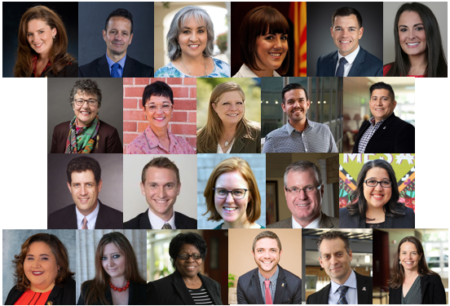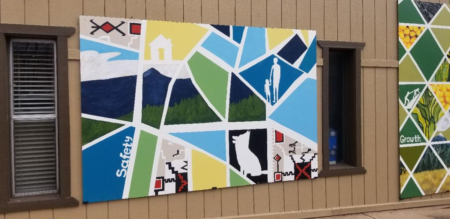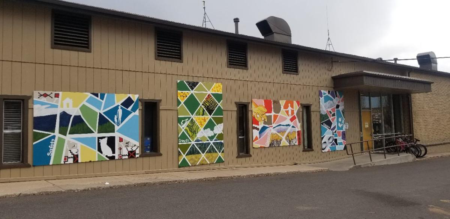Thoughts from Dawn Wallace

Hello Fellows!
Our team has been extremely busy over the last month reviewing applications for the 2020 Flinn-Brown Fellowship. For me, it has been a great discovery of the wealth of talent and creativity among Arizonans. I have thoroughly enjoyed reading about the amazing public-policy work that is happening in our state by truly impactful leaders. I am also really proud to say that more than ever, our applicants represent Arizona’s geography from all over the state—from Kingman to St. David to Yuma to Prescott Valley, and many cities and towns in between.
We recruited 22 Flinn-Brown Fellows to assist with the screening of applications. In teams of two, these Fellows helped us carefully consider the range of occupations, perspectives, knowledge, and experience within the cohort. As importantly, how the applicants described their desire to improve the state and their communities weighed heavily in our decision-making. The final selection task will be no easy feat. As the program has gained prestige, there has been increased competition for limited interview and seminar slots. However, in an effort to accommodate this demand, we are increasing our typical cohort from 25 to 30.
I want to extend my gratitude to the Fellows (pictured below) who assisted us in reviewing applications for the 2020 cohort of the Fellowship: Molly Edwards (2011), Mark Sanders (2018), Rosalva Zimmerman (2018), Amy Love (2019), Alec Thomson (2019), Brandy Wells Flores (2013), Cynthia Seelhammer (2016), Mignonne Hollis (2013), Julie Katsel (2014), Blaise Caudill (2014), Ricky Hernandez (2018), Chris Mathis (2011), Fletcher Montzingo (2017), Breanne Bushu (2016), Paul Brierley (2011), Trista Guzman Glover (2019), Mila Besich (2019), Sarah Douthit (2013), Gail Knight (2016), Chris Stoller (2015), Zach Brooks (2017), and Kate Morley (2018).

We will conclude the selection process by the end of June and begin preparations for the seminar series to begin in late August.
We are more than happy to help promote your work, so please reach out to me if you would like us to publicly recognize a professional accomplishment, event, or program with which you are involved.
Best,
Dawn
Fellow Spotlight

Flinn-Brown Fellow Sarah Douthit (2013) is the chief probation officer for the Coconino County Adult Probation Department. She has held a variety of positions in the criminal justice system in Arizona, including with Adult Parole, Adult Probations, and the Arizona Supreme Court. She is also an active member of the American Probation and Parole Association and has held several leadership positions in the organization. She is passionate about improving the criminal-justice system and is dedicated to servant leadership in Arizona to promote successful outcomes and healthy communities. After moving to Arizona in 1997, Douthit received a bachelor’s degree in philosophy from Arizona State University and a master’s degree in education from Northern Arizona University.
Can you please describe your work and how public policy impacts how you manage your operation?
I serve as the chief probation officer for the Coconino County Adult Probation Department. In my role, I oversee probation services for the county. For the large part, probation officers serve two primary roles: providing information to the courts related to people accused of a crime, and providing supervision in the community for people who have been granted a term of probation. Probation is typically granted as an alternative to incarceration where individuals are ordered to comply with a series of conditions, with an expectation that their behavior will change for the better. My officers assist individuals to develop a plan for interventions targeted at the most significant barriers in their lives. We refer people to services, maintain contact with clients and their families, and guide them to better future decision-making. We aspire toward a future of healthy communities and reduced recidivism. Our vision statement is: Building relationships and enhancing lives to create a safer community.
Historically, the criminal-justice system has been reactionary. Public opinion regarding a single case or situation can drive legislation and policy. Many of these past decisions have led to the serious issues of mass incarceration and mass supervision that we are grappling with today. Over the years, many in our field have begun relying more heavily on the 40 years of research we now have. A growing body of literature tells us that incarceration is not the best way to keep us safe.
As such, criminal-justice professionals have an obligation to provide education to stakeholders and policymakers. We know far more today about the influence of social determinants of health, childhood trauma, mental health, addiction, and systemic disparity than ever before. There are many advocates for criminal-justice reform. While I agree that improvements are needed in the system, the issues we encounter seldom begin with an arrest. Many times, the criminal-justice system serves as the most expensive social service of last resort. The vast majority of those that walk through our doors have lengthy stories of systemic failures—failures of the familial structure, education, communities, health systems, behavioral health. The list goes on. While these failures certainly do not excuse criminal behavior, they do help explain the patterns of mental-health issues, addiction, and behavioral problems our clients encounter. It is more fitting to say that we need societal or civilization reform. We cannot punish or incarcerate our way out of our current situation. Mass imprisonment is the most expensive way to not solve our crime problems.
How has the COVID-19 pandemic affected your work?
The negative impacts of COVID-19 are well-documented and discussed, so I will not list them all here. Like every other human experiencing this pandemic, we are all uniquely impacted by human tragedy. I will note, however, it has made some of our existing issues in the criminal-justice system even more conspicuous. There are systemic service gaps that have widened in this pandemic. While I applaud many of our providers and community partners for transitioning to online services so quickly, we do have many homeless and phoneless that are now more disenfranchised than ever before. Our business relies heavily on rapport and human connection. The virus has challenged every element of our profession and we are working diligently to address these issues.
Further, the fiscal impact of the situation is still unclear. Arizona probation departments rely heavily on fees paid by probationers. This population is often the least able to pay court-ordered obligations. Only time will tell how the pandemic will impact revenue needed to continue operations. We are currently holding many positions vacant to prepare for a possible recession. Sadly, our profession is no stranger to budget cuts, as we have never fully recovered from the Great Recession. We continue to innovate and create efficiencies, but our services have taken a hit. Unfortunately, history shows us when probation services are cut, prison costs increase.
On the optimistic side, however, there are some lessons we can take away that can improve service delivery and governmental programs. Through technology advancements, much of our office work can be done remotely. The next steps for us include reviewing new technology practices that may allow us to reduce our physical office footprint, while promoting a flexible workplace which appeals to many employees.
How has the Flinn-Brown Network been useful to you?
The Flinn-Brown Network is an incredible resource. I have access to subject-matter experts of all kinds that I would never have met if it wasn’t for the Network. Additionally, there is a sense of camaraderie and friendship that has developed over the years that I attribute to the connection of the Network. Participation in Flinn-Brown was life-changing for me, and I appreciate the access to such amazing people.
Through Flinn Foundation support for the Creative Communities program of the Arizona Commission on the Arts, your office received funding for a mural project that helps promote healthy relationships within the community. Please tell us a little about the program and why you believe it is important to foster a sense of philanthropic service in the community you serve?
Through the Creative Communities program, we were able to fund an initiative to inspire our community and clients to use art to think about what promotes and creates healthy relationships in the community. Over the course of two years, we worked with our clients and many community stakeholders to develop a visual representation of healthy relationships. The project resulted in client-created murals which are on display at our main office in Flagstaff. The grant allowed us to focus on the creative strengths of our clients to have a positive impact on the community. We often have probation clients with art skills, but lack access to materials, training, and a platform for prosocial expression. We are delighted with the response of the clients and community as we continue to promote art as a means for community health and healing.


Probation department unveils murals to reflect “culture change” / Arizona Daily Sun
If you are interested in connecting with Sarah, please contact her at:
Sarah Douthit
Chief Probation Officer
Coconino County Adult Probation Department
222 E. Birch Ave.
Flagstaff, AZ 86001
sdouthit@coconino.az.gov
www.linkedin.com/in/sarahrdouthit
Career and Professional Opportunities
First Things First invites you to recognize the extraordinary work being done on behalf of young children and families in Arizona communities by submitting a nomination for the Eddie Basha Regional Partnership Council Excellence Award. Please submit your nominations by June 19.
School Connect Arizona is in search of an executive assistant to the CEO, Tracey Beal, as well as a contributing member of our team. Please contact Brenda Sperduti, director of development, at 602-910-0480 or email brenda@schoolconnectaz.org.
The Arizona Department of Economic Security is hiring a deputy assistant administrator. Please contact Zee Mashhadani at 602-774-5516 or ZMashhadani@azdes.gov, or apply through azstatejobs.azdoa.gov.
Maricopa County Community College District is hiring an executive special assistant to the president at Rio Salado Community College in Tempe.
Find other jobs in the public sector with Government Jobs and azstatejobs.
Events and Conferences
The State of Black Arizona, led by Fellow Teniqua Broughton (2013), is partnering with the Arizona Osteopathic Medical Association and Arizona Medical Association to host a free webinar— Rare Disease Briefing: Access to Healthcare— on Wednesday, June 10 from 10 a.m. to noon.
The discussion will focus on rare disease patients’ needs and challenges during COVID-19, highlight cardiac amyloidosis as an example of an underdiagnosed disease that disproportionately impacts the African-American community, and review the major policy and access-to-care issues that impact rare disease patients and underserved populations.
The panel includes:
- Dr. Amish Shah, physician and Arizona House of Representatives, LD 2 legislator 4;
- Dr. Julie Rosenthal, Mayo Clinic physician;
- Imeh D. Ebong, Ph.D., rare disease patient; and
- Jon Amores, Arizona Medical Association director of government relations.
Flinn-Brown Fellows Updates
After working at Greater Phoenix Economic Council for nearly three years, Ruth Soberanes (2016) will take on a new role as a trade specialist at the U.S. Department of Commerce/Commercial Service in Phoenix.
Zachary Brooks (2017) has published a fascinating new book called “Discovering Your Human Algorithm: How to Live with Meaning and Purpose (How to Algorithm Book 1).”
Missy Duke (2018) will serve as American Pharmacist Association Speaker of the House and Trustee for 2021-2023.
On June 1, Paul Allvin (2012) started his new role as Vice President, Strategic Communications and Marketing at George Mason University in Virginia.
We have amazing Fellows who are running for office this year! Please let us know if we have not included your name.
- Lea Marquez Peterson (2011), Arizona Corporation Commission (re-election after appointment)
- Daniel Hernandez (2011), Arizona House of Representatives, LD 2 (re-election)
- Coral Evans (2011), Arizona House of Representatives, LD 6
- Joanne Osborne (2012), Arizona House of Representatives, LD 13 (re-election)
- Jarrett Hamstreet (2017), Arizona House of Representatives, LD 15
- Jennifer Pawlik (2018), Arizona House of Representatives, LD 17 (re-election)
- Debbie Nez Manuel (2017), Arizona House of Representatives, LD 26
- Aaron Lieberman (2017), Arizona House of Representatives, LD 28 (re-election)
- Raquel Terán (2018), Arizona House of Representatives, LD 30 (re-election)
- Becky Dagget (2014), Flagstaff City Council
- Erin DePrater (2018), Kingman City Council
- Tammy Caputi (2019), Scottsdale City Council
- Michelle Hess (2013), Buckeye City Council (re-election)
- Jodi Rooney (2018), Yavapai County Supervisor, District 2
- Juan Padres (2016), Pima County Supervisor, District 3